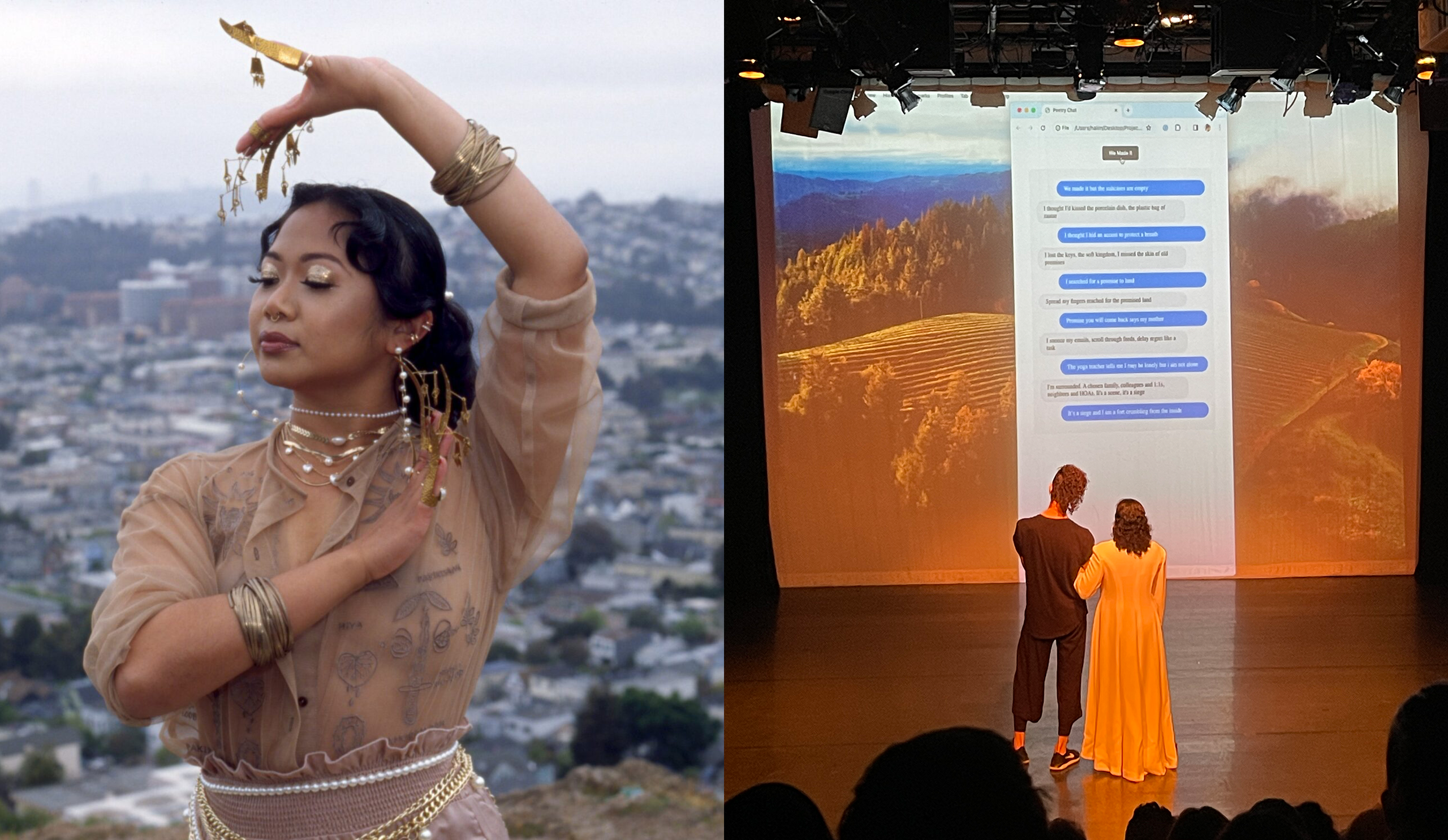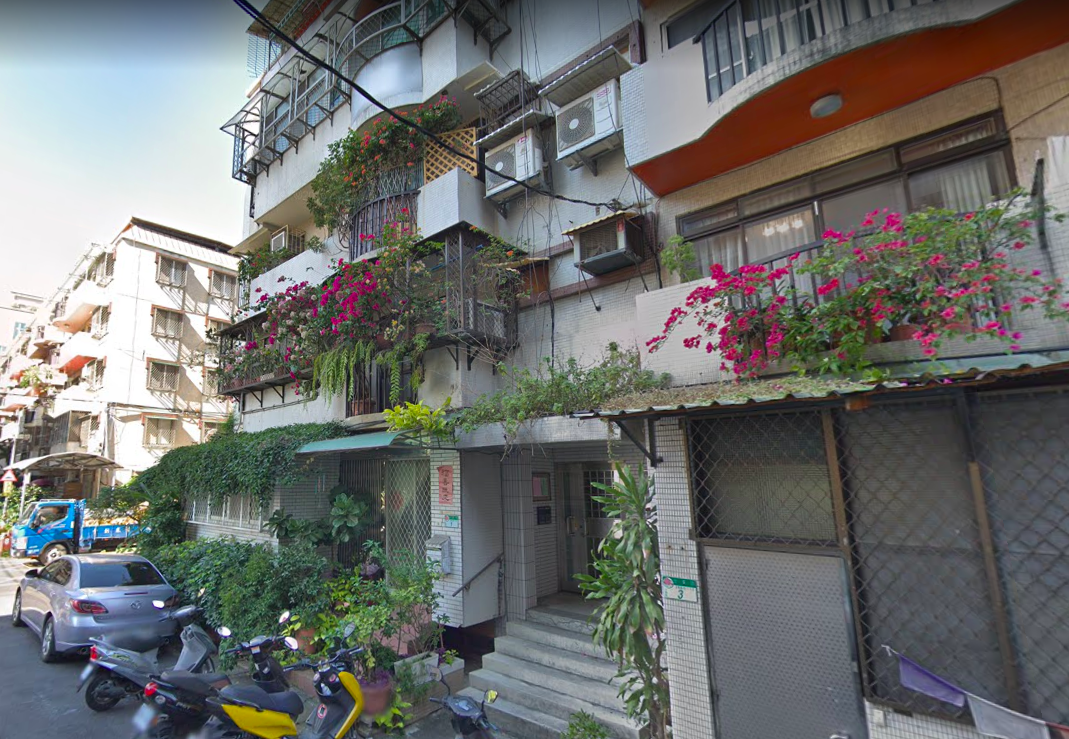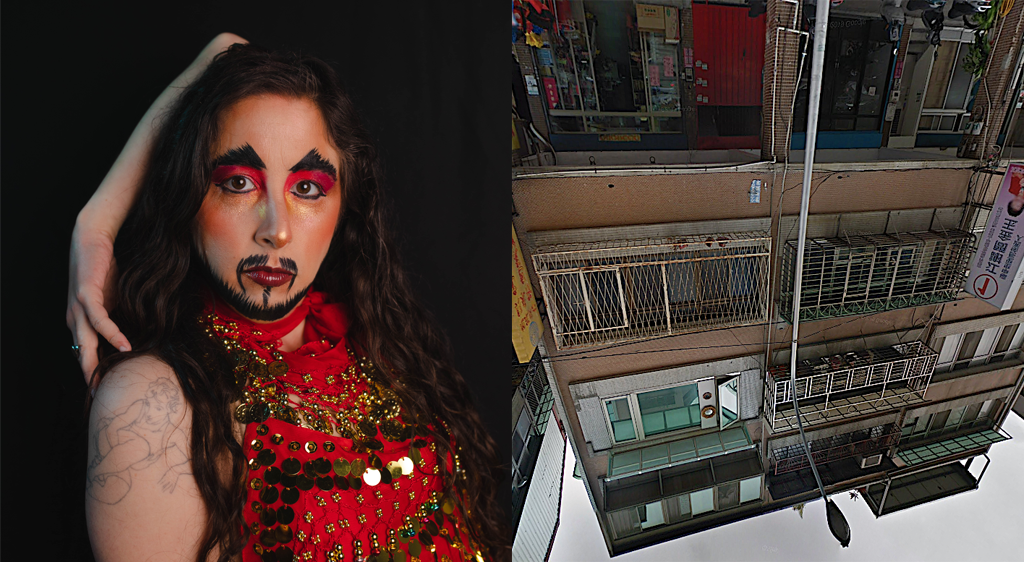After the first Work-in-Progress show, I worked with my Nautanki troupe on the suggestions given to us by the audience members and our friends at CounterPULSE, incorporating them into our second Work-in-Progress show. The changes have definitely made our piece more effective, and it now flows more smoothly. In addition, as a result of the integration of the feedback, the piece itself is more accessible to American audiences. The feedback session after our second Work-in-Progress show was once again a very helpful process. The audience appreciated and noted our changes from the first Work-in-Progress show and offered more suggestions that we are now incorporating.
A recent exciting event is my father’s arrival from India. As I have mentioned in my previous blogs, my father is one of the topmost artists of Nautanki in India, and is a living legend in the core region of Nautanki in Northern India. I grew up performing and learning from him. His arrival not only provides our Nautanki great strength in terms of performance quality, but also gives an invaluable opportunity to audiences in the Bay Area to get an authentic taste of traditional Nautanki singing as it is practiced in India. We are very fortunate to have our Guru — Pandit Ram Dayal Sharma — amongst us. His arrival has infused us with a lot of enthusiasm.
As I touched upon in my previous blog, I feel that we are giving birth to a new Nautanki — Mission Suhani. The new Nautanki Mission Suhani is not only an extended version of the previous rendition, but also has a different feel to it. It has many new scenes and songs, and also a new twist in the story line. But the main reason I see this as a new ‘birth’ is because almost all the cast members are fresh. In training the new members from scratch, I feel as if I am creating a new play altogether. They bring their own personalities to the script and interpret the roles in their own way, making it feel very different to me as a director. I can see the previous Mission Suhani and this new Mission Suhani as two very different artistic pieces.
Another exciting aspect to the new production is the inclusion of clarinet in the musical repertoire of our Nautanki troupe. David Alt is excited to work with us and learn Nautanki. Although he is familiar with the Hindustani classical style of music, this is his first exposure to folk musical theater from India. However, including clarinet in our musical accompaniment is not an innovation on my part. For the last half century, clarinet has been used by Nautanki artists in their shows. Like the violin, clarinet has been adopted & Indianized by musicians.
With all of these new elements, giving birth to the new Nautanki Mission Suhani has been an enjoyable and pleasurable experience.
However, bringing a traditional rural art form to the very urbane, materially focused, and goal-oriented Bay Area is not an easy task. The process has its own frustrations and difficulties. For instance, one of my actors (who was born and brought up in America) is having a really difficult time making her family understand the value of her journey into the world of Nautanki. It is very hard for her to get them to understand the “material” value of this undertaking, particularly when her family members cannot appreciate the value of something which is not money-oriented, urbane, tangible, and result-oriented in terms of material gains. I take these challenges in the right perspective. I realize that if I am to bring a fresh art form and perspective to the South Asian diaspora in the Bay Area, I have to take on these challenges.Although I have mentioned this previously in a different context, I would like to reemphasize that CounterPULSE has been an amazing source of support to us. They have not only supported us financially and logistically, but also emotionally. CounterPULSE is a group of sensitive and humane professionals who deeply understand the difficulties, frustrations (as well as joys), and vulnerabilities of artistic expression, and stand behind their artists firmly, supporting and guiding them through their journey. They have also helped us to promote our show in great ways. I was thrilled to see huge posters of Nautanki at the BART stations in San Francisco. It is such a thrill for an artist to see that kind of publicity of his work.
CounterPULSE has also inspired me to take Nautanki to the next level. I want to create a performance tour to take Nautanki to different places in America. After the Performing Diaspora shows, I would love to work further on this mission. As part of this tour, I also want to invite traditional Nautanki artists from villages in India. It would be an exciting experiment to put them together with software engineers, doctors, and other professionals. I envision that this would help create a mix of indigenous and cosmopolitan sensibilities that would carry Nautanki into the next generation. This mix of tradition and cosmopolitan will also support a flow of traditional knowledge to a new world. It is high time that a tradition such as Nautanki should break its confines and enter fresh, new grounds. I want to thank CounterPULSE for inspiring me, supporting me, and giving me hope to take Nautanki in new directions within the U.S. It gives me the energy to put in more effort to create awareness of folk/popular culture in India and involve more and more new people into my productions.
Share This!
More Good Stuff
‘Border / Line خط التماس’ by Jess Semaan and Halim Madi & ‘Sa Ating Ninuno (To Our Ancestors)’ by Kim Requesto December 5-6 & 12-13,
Unsettled/Soiled Group is a group of East, Southeast, and South Asian diasporic movers, makers, and settlers on Ramaytush and Chochenyo Ohlone land. Unsettled/Soiled Group is led by June Yuen Ting, one of CounterPulse's 2022 ARC Performing Diaspora artists and will debut Dwelling for Unsettling alongside VERA!'s Try, Hye!, Thursday through Saturday, December 8-10 & 15-17, 2022
Try, Hye! by Vera Hannush/VERA! & Dwelling for Unsettling by Unsettled/Soiled Group December 8-10 & 15-17, 2022 // 8PM PT // 80 Turk St, SF






